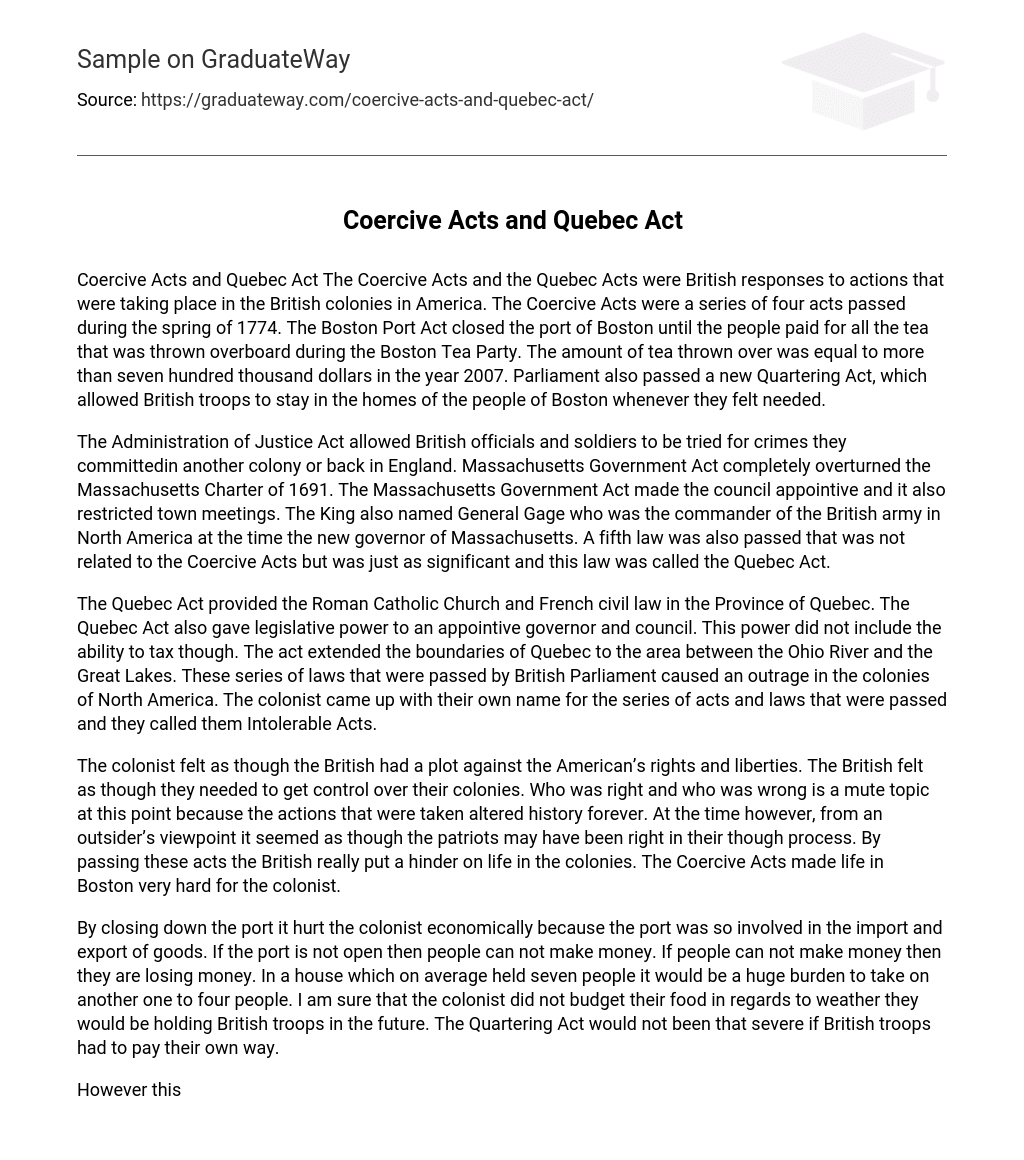The Coercive Acts and the Quebec Acts were British responses to actions that were taking place in the British colonies in America. The Coercive Acts were a series of four acts passed during the spring of 1774. The Boston Port Act closed the port of Boston until the people paid for all the tea that was thrown overboard during the Boston Tea Party. The amount of tea thrown over was equal to more than seven hundred thousand dollars in the year 2007. Parliament also passed a new Quartering Act, which allowed British troops to stay in the homes of the people of Boston whenever they felt needed.
The Administration of Justice Act allowed British officials and soldiers to be tried for crimes they committedin another colony or back in England. Massachusetts Government Act completely overturned the Massachusetts Charter of 1691. The Massachusetts Government Act made the council appointive and it also restricted town meetings. The King also named General Gage who was the commander of the British army in North America at the time the new governor of Massachusetts. A fifth law was also passed that was not related to the Coercive Acts but was just as significant and this law was called the Quebec Act.
The Quebec Act provided the Roman Catholic Church and French civil law in the Province of Quebec. The Quebec Act also gave legislative power to an appointive governor and council. This power did not include the ability to tax though. The act extended the boundaries of Quebec to the area between the Ohio River and the Great Lakes. These series of laws that were passed by British Parliament caused an outrage in the colonies of North America. The colonist came up with their own name for the series of acts and laws that were passed and they called them Intolerable Acts.
The colonist felt as though the British had a plot against the American’s rights and liberties. The British felt as though they needed to get control over their colonies. Who was right and who was wrong is a mute topic at this point because the actions that were taken altered history forever. At the time however, from an outsider’s viewpoint it seemed as though the patriots may have been right in their though process. By passing these acts the British really put a hinder on life in the colonies. The Coercive Acts made life in Boston very hard for the colonist.
By closing down the port it hurt the colonist economically because the port was so involved in the import and export of goods. If the port is not open then people can not make money. If people can not make money then they are losing money. In a house which on average held seven people it would be a huge burden to take on another one to four people. I am sure that the colonist did not budget their food in regards to weather they would be holding British troops in the future. The Quartering Act would not been that severe if British troops had to pay their own way.
However this was not the case so rather than put food in the mouths of their children instead they were putting it in the mouths of the troops of Britain. The Administration of Justice Act I think was the worse of the Coercive Acts in the eyes of an outsider or a colonist. British Law said that you will be tried by a jury of your peers in the place where the crime was committed. By allowing troops and officials to leave town when they faced trial was a slap in the face to the colonist. It was totally against British Law and the people of the colonies still considered themselves to be royal subjects of the British Empire.
How is it fair that if John Adams kills a man in Boston he is tried in Boston but if General Gage kills a man in Boston he gets on a ship and goes back to England for trial? You can see how this would upset the colonist. The Quebec Act is the straw that broke the camels back from an outsider’sviewpoint. Quebec is allowed to rule themselves however the colonies rules are not even coherent with the laws and rules of their governing body the Empire of England. Why should one group of people be allowed to live their life how they seem fit when another group in the same is is not allowed to do the same?
This is not good business on the part of England and I can see looking from an outsider’s viewpoint how the colonies would be enraged by this. Business is tough to do from a distance in the year 2009. In the 1700s when these laws were passed business must have been pretty close to impossible to do over the Atlantic ocean with the only way to communicate is through letter that is carried by a ship. When Britain gave freedom to Quebec the smart move would have been to also grant the same rights to the American Colonies.
Britain did not choose to do the smart move and it cost them in war which ended up with Americans winning that right. Once a child is old enough to stand on his own, let him stand. Once he is old enough to make a living for him let him work. Once he says dad I am my own person let him be that person. Do not stand in the child’s way from progressing. The mighty power of Great Britain tried to stand in the way of their young and growing colonies rather than let them be who they were set out to be and it ended up hurting them in the end.





